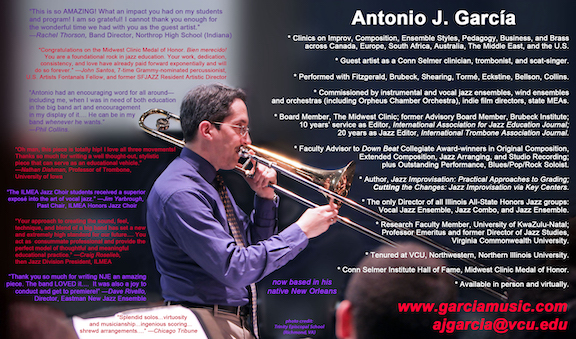Click on the photo for larger image and photo credits.
|
"If a panel of eminent leaders met to discuss 21st-century challenges such as climate change and globalisation with the same degree of intelligence, sincerity, and respect for diversity of opinion represented in this study, we would soon see a better world for all. Actually, Professor García's more modestly focused Jazz Improvisation: Practical Approaches to Grading addresses quite complicated problems surrounding the grading of students, particularly the contradictions and vulnerabilities implicit in evaluating creativity. "How one does this in real life turns out to be a contentious philosophical problem with a surprisingly wide spectrum of responses—including a sophisticated argument for not even trying. (Fortunately, by the time we reach the end we find the job can still be done.) "Although initially based on the author's original survey material, this is far more than a compilation of responses. García has produced a lucidly written, probing, analytical, and ultimately 'practical' resource for professional jazz educators, replete with valuable ideas, advice, and copious references. He presents his own well-honed views in the chapter 'Personal Reflection.'" |
Click on the photo for larger image and photo credits. |
|
|
"In day and age of assessing every facet of learning, it is imperative that we are well-versed in a language of evaluation that is understood by students, colleagues, and administrators. Perhaps there is no greater challenge than to sculpt and adapt a definitive measuring tool designed specifically to address the discipline of jazz. Tony has brilliantly achieved this goal and gone far beyond by spotlighting the practices of successful jazz educators across the country (and around the world)." |
|
"Groundbreaking. The comprehensive amount of material García has gathered from leaders in jazz education is impressive in itself. Plus, the veteran educator then presents his own synthesis of the material into a method of teaching and evaluating jazz improvisation that is fresh, practical, and inspiring!" |
|
"This is a much-needed, comprehensive look at the many facets of assessing and grading jazz improvisation while also offering a variety of instruction-ideas and practices for teaching this art form. This resource very carefully addresses the many questions, frustrations, concerns, and challenges surrounding the academic assessment of this very unique art form. García passionately shares his jazz improvisation teaching experience and that of many fine jazz educators from around the country in this quick and relaxed read. Whether you're a new or veteran jazz improvisation instructor, Jazz Improvisation: Practical Approaches to Grading is an excellent resource!" |
"Tony García challenges us all to teach and grade what is important, not simply what is easy to grade! In one telling example, he asks his jazz pedagogy students to identify their "Top Ten Peeves" regarding beginning improvisers, then design their curriculum around those points. This amazing resource-book combines his personal insights with input from a large number of highly regarded jazz educators." |
"Tony’s book addresses a most important, overlooked area of
jazz education. Improvised jazz solos are very subjective and personal. No
matter the level of performance, not all listeners will hear the solo the same
way. Tony’s suggestions, along
with the many comments, will pave the way for more comprehensive grading. This
book should be mandatory reading for all graduating music ed students." |
REVIEW BY THE MARLOWSPHERE |
INTERVIEW WITH THE AUTHOR |
DOWN BEAT ARTICLE |
"BRAVO. So needed and so well put together. This wonderful and essential publication makes a huge difference and puts these questions that many educators have into a very clear and concise book." |
"This longitudinal research conducted by Professor García serves as a wonderful evaluation tool to help educators measure the growth and improvement of their students. This method will aid in the quality of teaching and learning of jazz improvisation worldwide." |
"In the world of academic instruction there are many books—especially textbooks—that are quite long (and expensive) but have little to say of any substantive consequence. Then there are books that are relatively short but are packed with relevant information and do have something substantive to say. Jazz Improvisation: Practical Approaches to Grading...belongs in the latter category.... [It] is not just for jazz educators who teach improvisation. The philosophical heart of this book is about bringing out the creative best in students, albeit by starting with the fundamentals. It is about approaching each student as an individual learner with varying degrees of talent and intellect compared to others. It is not just about grading, it is about how to be a more effective teacher." |
